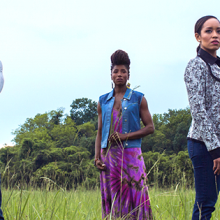TV
THE BEST WORD to describe The Good Wife (2009-2016) in comparison to its prestige TV peers may be generous. Its predecessors (The Sopranos, The Wire, Mad Men, Breaking Bad) in the TV golden age of the early 2000s set the expectation that serious dramas on the small screen have seasons of about 13 episodes each and air on platforms you must pay for (cable channels such as HBO and AMC, and now subscription streaming services like Netflix). In contrast, less-than-highbrow thrillers with a bit of humor, like the police procedural NCIS, pour out nearly double that amount of content per season on free network TV.
But The Good Wife on CBS defied that expectation. Here was a network drama that was just as revelatory about humanity as the best of cable’s offerings while also being hilarious, accessible, and plentiful (seven seasons of no fewer than 22 episodes each). In a world where complex female TV protagonists are still too rare, revisiting The Good Wife is a holiday break well spent.
Copaganda refers to any piece of media that portrays police as a necessary social institution. While this can include viral videos of police chatting with neighborhood kids or doing lip-sync battles, the most pervasive examples of copaganda are found in pop culture.
People need to believe in something, or someone, or Someone.
This human need to believe is a very powerful force. It can overcome a great deal of countervailing evidence. One place this is obvious is in politics.

Image via Queen Sugar Facebook.
Ultimately, as audience members, we have the power to control what we see. TV execs need our eyes watching the programming they select, and if we say we want diversity — if we purposefully watch more shows that are inclusive and that introduce us to narratives and cultures that are simultaneously new to us and reminiscent of our own lives — we can change the television landscape. We can change what we see and thus make sure that everyone is seen.
FEELING STRESSED BY CURRENT EVENTS, weary of ugly public discourse and the contentious sniping among even those who claim the same political party or faith? Maybe what you need is context—a look at the sweep of history and the enduring mysteries of existence. It’d be nice if there were a guide. Perhaps someone with a rich, velvety voice and calm presence to accompany you to far-off places and times—even better, to take you there on a private jet—and to not only ask deep questions but arrange for experts to posit answers.
You may be in luck: The Story of God is a six-part documentary series scheduled to air weekly on the National Geographic cable channel beginning on April 3. Actor, producer, and Story host Morgan Freeman travels the globe to glimpse how some religions (and a bit of modern neuroscience) attempt to answer our big human questions. Is there life after death? How was the universe created? Will the world end, and how? Who is God? What is the root of evil and how has our idea of it changed over time? Are miracles real?
(Let’s just get this out of the way now: Yes, Freeman has played God in two feature films, Bruce Almighty and its sequel Evan Almighty. No, he is not reprising the role in The Story of God.)
Given the enormity of the task Freeman and the other producers set for themselves—wrestling with theological conundrums, including some perspective from ancient beliefs and each of the five major world religions (Judaism, Christianity, Islam, Hinduism, and Buddhism), shooting in 13 countries, and whittling all that footage down to six hours total for airing—they did admirable work. It’s impossible to go deep or broad into a religion within those kinds of constraints, but the threads of history and theology presented, and the experts presenting them, are interesting and legitimate. There are bits of melodrama in the framing of Freeman’s quest and in some of the dramatizations of historic events, but this is edutainment TV, not a graduate school seminar.

David Duchovny and Gillian Anderson in the “Babylon” episode of The X-Files. Image via Ed Araquel/Fox/RNS
“In this universe, the world’s vastly diverse population of Muslims is reduced to a monolithic symbol,” Ismat Sarah Mangla wrote in the International Business Times.
JESUS RETURNED this past August. Or at least a new depiction of him appeared on late-night cable television, in the comedy Black Jesus, created by Aaron McGruder (of The Boondocks). There was no rapture, and no subsequent tribulation, beyond what passes for normal these days. Instead Jesus appeared, as he did in Palestine, in a manner both obscure and mysterious. And, again, his incarnation became a scandal among some of the powerful and pious.
In Black Jesus, on the Adult Swim network, the second person of the Trinity turns up one day on the streets of Compton, a very poor and heavily African-American community in southern Los Angeles County. Played by a tall and beefy Gerald “Slink” Johnson, Jesus walks the streets in his first century robe and sandals, but with his hair in a Tina Turner perm. Aside from the eccentric get-up, this Jesus fits right into his surroundings. He has no cash, and no place to lay his head. But that goes for plenty of Comptonites. He enjoys malt liquor and marijuana, just as much as he did good wine back in the day at Cana. He’s still preaching and practicing unconditional love, forgiveness, nonviolence, and service to all, but his street talk averages about 1.5 bleeps per sentence.
There’s plenty that’s problematic about Slink Johnson’s character. For one thing, I can’t imagine the Jesus I know using the disrespectful canine term for women so freely or being quite so nonjudgmental about the marijuana trade. But neither does this depiction approach “blasphemy,” which is what the American Family Association called it. The Catholic League, which often leads the charge against perceived offenses to the faith, got it about right when it said, “The Jesus character in this show is a mixed bag: He is irreverent and can be downright crude, but he also has many redeeming qualities.”
Listen in as Jim Wallis and Sojourners CEO Rob Wilson-Black kick off the new year with a discussion on Pope Francis and the new Pope's influential presence in all kinds of media.
Author’s note: If you know me, you’d know that that I think the most important thing (of the things we worship ) is Jesus. And you’d also know that I love Arrested Development, with almost the same type of devotion I typically reserve for God. As a former “professional church lady,” crafting prayers was right in my wheelhouse. So I’ve composed a psalm entirely out of Arrested Development quotes based on the ACTS style of prayer, because it is right, and a good and joyful thing, always and everywhere to give thanks to God. And also … not Aunt Lindsay’s nose.
Oh God. (AD 2:13)
I love you. (AD 1:7)
We all must seek forgiveness. I’ve always tried to lead a clean life. My brother and I were like those Biblical brothers, Gallant and, um … Goofuth. (AD 2:14)
Last night, Jim Wallis appeared on "The Ed Show" to discuss why it's imperative to avoid cutting social programs like food stamps that feed millions of poor and hungry in our country. Those pastors who disagree, he says, usually don't know the faces of those directly affected by such cuts. You can watch the segment Jim appeared on here:
I love Netflix. I love that from the comfort of my couch, I can watch almost an endless selection of movies and TV shows. I’m re-watching all of The West Wing right now, along with most of Washington and probably much of the country. My friend Kat told me recently that she and her fiancé are watching it for the fifth time on Netflix, despite it sitting in a deluxe DVD set above their TV. Why get up to switch DVDs when your streaming player automatically starts the next episode for you?
So I wasn’t too happy when I read that my Netflix habit is seriously energy intensive. In a new article on Salon.com, I learned that watching Netflix streaming for an hour a week uses more energy each year than two new refrigerators. In my household we definitely watch a lot more than an hour a week.
Mixing religion and entertainment, as NBC has tried to do with its new prime time TV sitcom Save Me, starring Anne Heche, can be a tricky business.
Sometimes the combination works spectacularly, marrying a religious base with a significant crossover audience. When the chemistry is right, shows built around faith and divine intervention land in the ratings Top Ten year after year, and earn numerous Emmys.
CBS had mainstream hits with Highway to Heaven in the 1980s and Touched by an Angel in the late 1990s. The WB/CW’s 7th Heaven ran for a decade.
HOW IS IT that a miniseries based on the Good Book could evoke sectarian and violent notions of the Divine that would have seemed backward to some even back in the era of melodramatic biblical epic cinema? The History channel’s The Bible, like so much of so-called “religious pop culture,” seemed to be the product of good people trying to do a good thing, but at best putting the desire to convey a particular message ahead of making the best artwork for the medium.
The politics of The Bible seemed to perpetuate an “us vs. them” lens. It left me wishing for a treatment of scripture presented from the perspective of the marginalized, instead of a portrayal of “victory” as being the deaths of people considered different. Couldn’t someone make an Exodus movie about Moses’ neighbors—you know, the ones who saw God’s favor rest on the boy next door, while their son was killed by a psychopathic king? Or one focused on the myriad people groups considered “unclean” and worthy of genocide at the hands of those who claim to speak for God? Or a rendering of John’s Revelation that understands it as a poem about remarkable beginnings, the battles of the human heart, and a love willing to remake the world to set us free from the traps we’ve laid for ourselves? You don’t even have to be that controversial—can’t someone just make a decent movie about Ruth or any of the many cool women in the gospels?
LOS ANGELES — No sooner had Eric Andrews arrived on the set of The Lost Valentine, a 2011 Hallmark Channel movie starring Jennifer Love Hewitt and Betty White, when his neckwear attracted attention.
“People are looking at me, and trying to figure out who I was,” he said. “One of the actors came up and said, ‘Now, are you an extra for the wedding scene that is being shot?’”
But the Roman collar was no prop.
Andrews’ credentials as an ordained Roman Catholic priest and Hollywood producer make him a rarity in both religious and entertainment circles. The 48-year-old describes himself as too liberal for most priests and too conservative for most agents.
Why, exactly, does it matter if President Barack Obama gave a lackluster performance in the recent presidential debate?
These quadrennial campaign sideshows have nothing to do with one's capability, preparation, aptitude or suitability for the presidency.
Why does Gov. Mitt Romney's spirited performance matter? What does a “victory” by one candidate mean, other than momentary bragging rights?
Surely we know that these debates are about as meaningful as an Oscar winner's thank-you speech. What we want from a president is a steady hand in dealing with a wicked and wayward world, a collaborative spirit in bringing a broad reach to government, and a magnanimous spirit in consoling war widows, helping victims of disaster, protecting the weak from the relentless predations of the strong, and trying to preserve an “American Dream” to which all, not just a few, are invited. We want signs of character, not a telegenic mien.
Presidential debates are like first visits to possible in-laws. You hope not to belch at supper — and then you return to the world where you are actually exploring marriage and building a life.
Watching TV is bad for kids' self-esteem, except if they're white boys. (Seems likely that too much TV is bad for everyone's esteem for their fellow humans, made in the image of God ...)
"A new study suggests exposure to today’s electronic media often reduces a child’s self-worth.
Indiana University researchers say this is the case if you are a white girl, a black girl or a black boy.
However, researchers believe the media exposure can help the self-confidence of white boys.
... In the study, the researchers surveyed a group of about 400 black and white preadolescent students in communities in the Midwest over a yearlong period."
Read more here.
In this segment from his new CatholicTV series "Blinks," the Rev. Jim Martin (aka our favorite Jesuit) considers why Christianity is often considered so joyless, and why "religious" usually means serious.
Watch inside...
1984 is three years past, and the Brave New World is just 20 minutes into the future. That's where the computer-run and video-tranced world of ABC-TV's "Max Headroom" is located.












